Now Reading: Vaccine Chief Peter Marks Ousted Over RFK Jr. Claims
- 01
Vaccine Chief Peter Marks Ousted Over RFK Jr. Claims

Vaccine Chief Peter Marks Ousted Over RFK Jr. Claims
In a dramatic twist that has rocked the U.S. public health landscape, Peter Marks, the FDA’s top vaccine chief, has been ousted amid a fierce battle against misinformation. This pivotal development underscores an urgent call for integrity in vaccine communication at a time when controversial voices, such as RFK Jr., are stirring debates with misleading claims. In this blog post, we delve into the details behind Marks’ departure, analyze the impact of RFK Jr.’s narratives, and explore the broader consequences for public health policy and trust in vaccine safety.
Peter Marks: A Respected Leader in Vaccine Safety
Peter Marks has built a reputation as a cornerstone of vaccine safety within the FDA. His tenure was marked by a steadfast commitment to evidence-based practices that ensured robust protocols and transparency in vaccination programs. As one of the top vaccine officials in the nation, Marks played a critical role during public health emergencies, including directing efforts during the COVID-19 pandemic. His leadership not only contributed to the rapid development of life-saving vaccines but also to a legacy of scientific integrity and public trust.
The Decision to Step Down: A Stand Against Misinformation
Marks’ resignation was not a decision made lightly. In his farewell remarks, he clearly highlighted the damaging impact of persistent misinformation in the realm of public health. The continuous spread of false narratives—most notably those associated with RFK Jr.—undermined public confidence in vaccine efficacy and safety. Marks’ decision to leave his position serves as a bold stand against the tide of misleading information that can jeopardize the hard-earned trust built between public health officials and the communities they serve.
His exit is a somber reminder of the increasing pressure on top vaccine officials to defend scientific facts in an era dominated by rapid information—and misinformation—spread through digital channels.
RFK Jr. and the Misinformation Crisis
The controversy surrounding RFK Jr. has reached new heights as his statements and commentaries continue to generate significant public backlash. RFK Jr.’s controversial claims have been widely criticized by scientists and public health experts for their lack of solid scientific backing.
The Ripple Effects of RFK Jr.’s Comments
RFK Jr. has emerged as a polarizing figure largely due to his persistent assertions that challenge established vaccine science. These comments, often steeped in skepticism, have fueled vaccine hesitancy and led to heightened confusion among the public. With each instance of misinformation, the challenge for regulators like Peter Marks becomes ever more daunting. His departure is partly a response to this environment of ongoing misinformation that not only distorts public discourse but also risks derailing comprehensive public health initiatives.
The rapid spread of such false narratives has tangible consequences. Undermining vaccine confidence can lead to lower immunization rates, which in turn may result in resurgences of preventable diseases—a scenario that public health officials have tirelessly worked to avoid.
Peter Marks’ Legacy: Championing Vaccine Integrity
Throughout his illustrious career, Peter Marks has been a staunch advocate for rigorous safety standards and clear, factual communication in public health. His contributions have set a benchmark for transparency and accountability at the FDA, ensuring that every vaccine approval is backed by comprehensive scientific data and robust clinical trials.
A Career Anchored in Dedication and Evidence
Marks’ leadership during critical moments—such as the rapid development of COVID-19 vaccines—demonstrates his unwavering commitment to public health. His work has been characterized by a commitment to evidence-based policy and ethical oversight, making him a respected figure among peers and a trusted source for millions of Americans. His resignation, although controversial, signals the immense challenges faced by those at the forefront of combating misinformation.
Implications for the Future of Public Health Policy
The departure of Peter Marks not only leaves a significant gap in leadership but also raises profound questions about the resilience of public health institutions in today’s complex information landscape. It serves as an opportunity to re-evaluate how regulatory bodies can better safeguard scientific communication against the onslaught of misinformation. Moving forward, this incident may inspire a recalibration of strategies that promote transparent dialogue and foster strengthened collaboration between scientists, policymakers, and community stakeholders.
Rebuilding Trust and Enhancing Communication
The aftermath of Peter Marks’ exit calls for a renewed focus on rebuilding public trust through strategic communication and community engagement initiatives. Health agencies must prioritize clear, accessible information that reinforces the importance of vaccines and demystifies the approval process.
Strategies for Strengthening Public Outreach
- Educational Campaigns: Launching comprehensive educational initiatives that elucidate how vaccines are rigorously tested and proven safe can empower the public with factual knowledge.
- Community Engagement: Encouraging open dialogues between trusted health experts and local communities helps dispel myths and fosters a culture of transparency.
- Digital Literacy Programs: Given the vantage point of digital media in disseminating information, programs aimed at increasing digital literacy can aid in differentiating between credible sources and misleading claims.
By focusing on these strategies, public health agencies can better navigate the turbulent aftermath of high-profile controversies and set a course toward renewed public confidence.
Conclusion
Peter Marks’ resignation as the FDA’s top vaccine chief over RFK Jr.’s misinformation claims signals both a cautionary tale and a turning point for public health in the United States. His legacy—a relentless pursuit of scientific integrity and public safety—reminds us of the critical importance of basing public discourse on accurate, peer-reviewed data rather than on unfounded speculations. As the debate over vaccine safety continues to evolve, it is imperative that regulatory agencies uphold the highest standards of transparency and communication to safeguard public health effectively.
Disclaimer: This blog post is for informational purposes only and does not reflect the views of any public agency.











